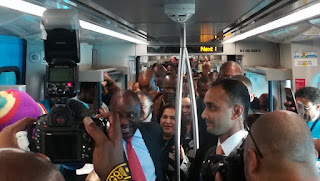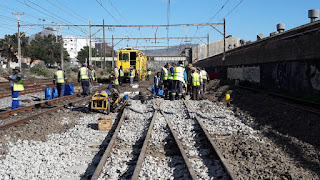Cape Town mayoral committee member for safety and
security, JP Smith summed up the city’s embattled rail infrastructure as:
“People talk as if Prasa [Passenger Rail Agency of South Africa] must still
collapse. It has already collapsed.”
Once upon a time Metrorail was the backbone of transportation
in the Western Cape.
No longer is the rail company the prime mover of most
of those who contribute towards the economy in the province.
Commuters are subjected to daily train
cancellations and, for those fortunate to get a train, it is almost always delayed.
Multiple factors
contribute to the frustrating situation.
Most delays are due to obsolete infrastructure, the
result of decades of disinvestment in passenger rail.
To make matters worse, there are daily incidents
of vandalism and, since October 2015, there have been frequent train-related fire
incidents.
“Commuters no longer depend on Metrorail because
the failures of the rail agency are forcing them to make use of their own
alternative transport,” said Dan Plato, Cape Town’s Mayor in waiting.
In January, Prasa went as far as to admit the
system had derailed and that it was unable to guarantee a safe journey to
commuters.
Fast forward 10 months to the beginning of
October, and the Rail Safety Regulator (RSR) issued a suspension notice to
Prasa which read: “Prasa Rail cannot demonstrate confidence to the RSR that it
has the ability, commitment and resources to properly assess and effectively
control the risks arising from its railway operation – to the detriment of the
safety of those who may be affected by its railway operations.”
Two days later, Prasa dragged the RSR to court in
a bid to stop the regulator’s intention to cancel train operations. In a
supervisory order, Prasa was told by the Pretoria North Court to “stick to the
safety requirements of the RSR or end up being cancelled”.
Judge Cassim Sadiwalla said: “This is a case of
national importance. Prasa is responsible for creating a safe rail environment
for employees and commuters.”
This reiterates a 2015 Constitutional Court ruling
that Prasa had an obligation to protect commuters from any form of incident.
The directive by the RSR relates to the
every-increasing number of manual authorizations of trains. This means Prasa’s
maintenance management is not improving.
Prasa spokesperson Nana Zenani said: “At least 33%
- or 165 488 – of the manual authorization incidents in the country are
because of vandalism of signal equipment and cable theft”.
In terms of the court order, Prasa is obliged to give
monthly written progress feedback to the RSR and the judge. The rail operator
may also not deploy or use new rolling stock without prior approval by the RSR.
Furthermore, a comprehensive integrated asset condition
assessment report – for all of Prasa’s railway infrastructure – needs to be
handed over to the RSR by March 2019.
Metrorail Western Cape spokesperson Riana Scott
was initially not keen to respond to a list of questions regarding train
operations, security and customer communication, and their direct effect on commuters,
staff and stakeholders.
Zenani referred all questions on the state of
Metrorail Western Cape to the regional manager, Richard Walker.
“The operational
responsibility in the Western Cape is with Walker and his team. They should
account for operational matters.”
After doing so, Scott said: “Re-signalling for
the Cape Flats Line and Southern Line between Salt River and Fish Hoek is
complete. Central and North have yet to commence.”
When asked about plans to start on the other
lines, Scott said she could only respond with the information she had available.
Walker, in August, told
members of the media re-signalling for Central Line would start later this year
to early 2019 and North between late 2019 and mid-2020.
On the effects
of re-signalling, Scott explained: “Experience has shown the inadvertent impact
of migration to new technologies has sporadic
service system failures as part of commissioning and testing new technology.”
This,
together with old infrastructure has largely contributed to major service
disruptions.
At this stage there is no due date
for completion.
While
Metrorail and Prasa have yet to admit as much, frequent commuter experience has
shown that until upgrades have been completed, commuters are in for a long tough ride.
Customer
communication – the one thing Metrorail can control – does not seem to be a
priority. This is also evident from the hundreds of complaints you read on social media.
In August 2017, Walker admitted to members of the
Western Cape provincial legislature’s standing committee on transport that “Metrorail
is not communicating enough with commuters.”
In February 2018, Prasa
group executives told members of the parliamentary portfolio committee on
transport “Commuters would be happy with more communication.”
According
to Scott: “Customer concerns are assessed, and efforts are made to educate, elaborate
on and explain issues.”
Like
her boss, Scott concede that many complaints relate to lack of communication.
“Trains
have no on-board announcement capability,” she said. “This leaves Metrorail
reliant on SMSes, via an external service provider, on social media and on centralised
announcements.”
 Scott added not all stations have
operable announcements systems.
Scott added not all stations have
operable announcements systems.
“Stations with operable systems can
make local announcements and loudhailers are available to be used at stations
by staff.”
She further explains: “As modern
systems replace outdated ones the integration of information is often
temporarily not possible. Like information on electronic display boards often
misaligned to real operating conditions during service interruptions.
Plato,
who attempted to catch a train this week from Mitchells Plain to Cape Town
station to experience first-hand what train commuters are subjected to, said:
“Until problems at top level are not resolved, it is commuters who will continue
to suffer because of a lack of action.”
In February, Economic Freedom Fighters MP, Nontando
Nolutshungu, told Prasa: “Commuters only want to know how you take them to work
or home and what are you doing if trains are cancelled. There should be a simple plan.”
DA MP, Manny de Freitas, was less diplomatic,
saying “Prasa has no clue what is happening on their tracks. This justify the
frustration amongst commuters”
Transport portfolio
committee chairperson, Dikiledi Magadzi said: “Commuters hanging on trains are
torture and Prasa officials are not realistic when talking about modernisation
plans.”
Apart from all the
vandalism Metrorail Western Cape has since October 2015 lost half their trains
sets in train fire incidents. To date train carriages lost in fire incidents in 2018:

- 4 on 22 Mei at
Retreat
- 2 on 30 Mei at
Ottery
- 3 on 18 Junie at
Steenberg
- 2 on 25 Junie at
Philippi
- 7 on 21 July at
Cape Town
- 5 on 26 July at
Retreat
- 2 on 28 July at
Cape Town
- 2 on 21 August at
Koeberg
- 5 on 28 September
at Dal Josaphat
- 2 on 28 September
at Firgrove
- 1 on 28 September
at Cape Town
- 8 on 9 October at
Cape Town
|
In the Ottery incident
Leigh Jansen sustained third degree burnt wounds. A 35-year old female commuter,
originally from the Eastern Cape, died in the fire. She was not the only train
fire casualty.
In January 2016 navy
cadet Gerald Gouws died in a train fire at Glencairn. It took DNA-test two
months to confirm the identity of the 23-year old from Uitenhage in the Eastern
Cape.
It remains a mystery who is behind the suspected
arson attack at Metrorail. All stakeholders agree it is a well-orchestrated
plan to destroy rail transportation.
In July while visiting
torched carriages transport minister dr. Blade Nzimande said: “Prasa spends
thousands on security but there is no value for money.
He declared the rail
operator in the province a priority, but since then more carriages went up in
flames and no plans implemented.
Magadzi is more
frustrated that there is no movement at Prasa and said: “It is a concern that
Prasa receives money to improve security, but it is not used for that. There is
just no improvement.
Commuters want to know how is it that trains
burn, even with a security presence on platforms.
In the province, Metrorail has only 1845 security
officials. Of these,789 are employed by Prasa; the rest are contracted security.
These include officials
who do special investigations, administrative duties, staff on leave and/or training.
In support of these officers, a joint project by
the city, the Western Cape government and Prasa was meant to be launched this
week. There was, however, a twist: The deployment of the City’s rail unit was
delayed as it was still awaiting permission to operate on Prasa infrastructure.
Cape Town mayoral committee member for transport
Brett Herron sum up how commuters feel: “To travel the way thousands of train
commuters do daily is unimaginable. The conditions are horrifying… In my
opinion unconstitutional!”
This is an unedited version of an article originally published in City Press on Sunday 21 October 2018

























